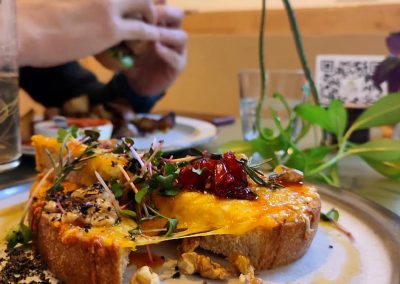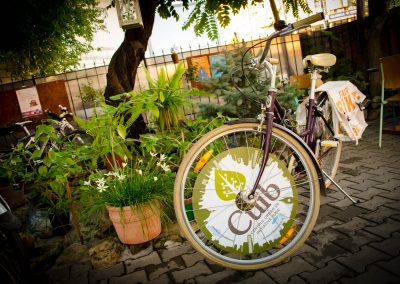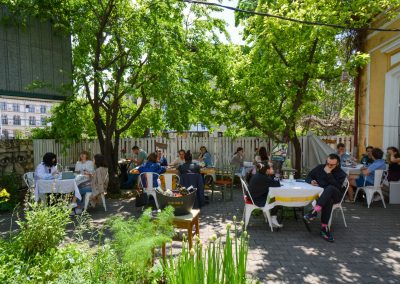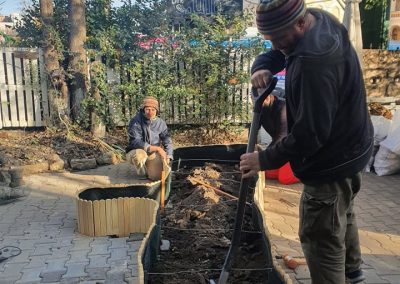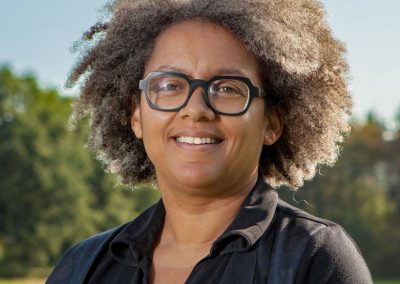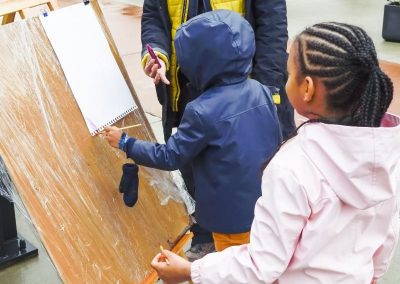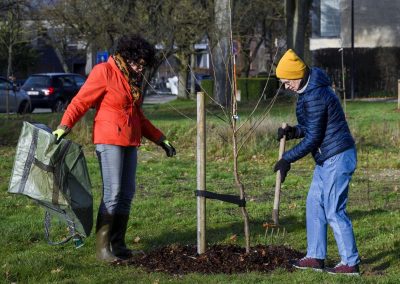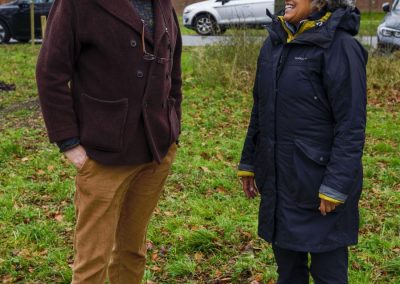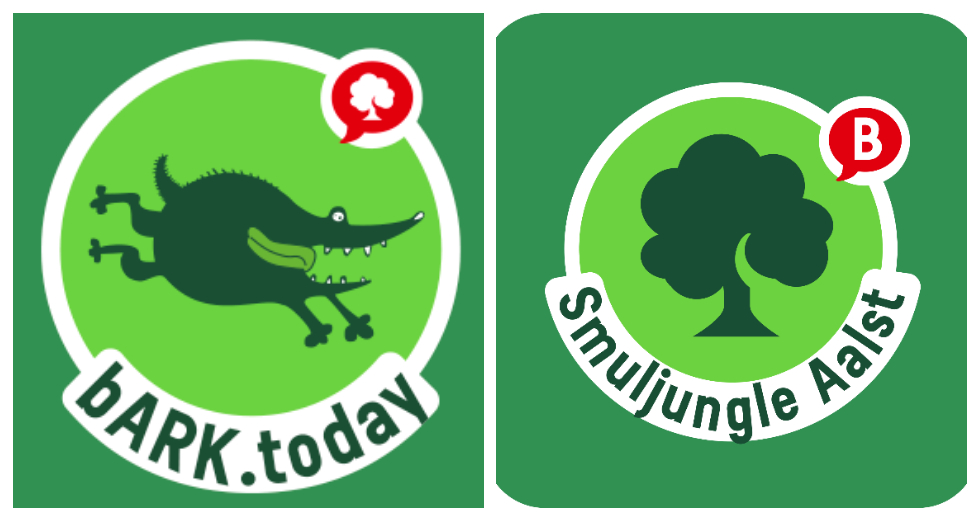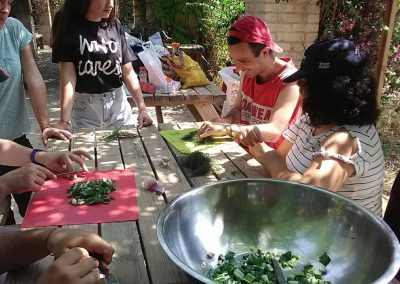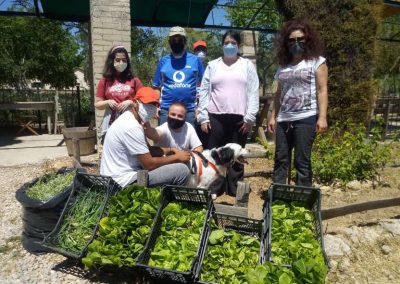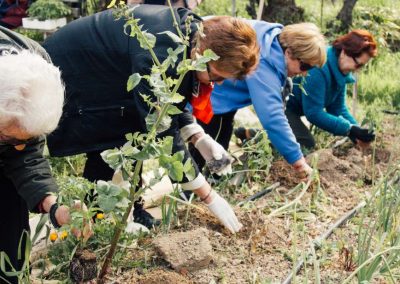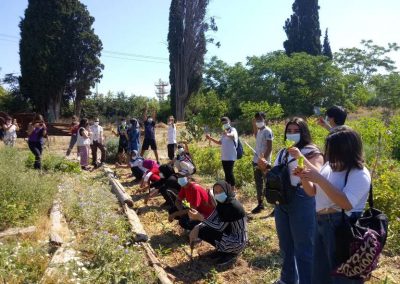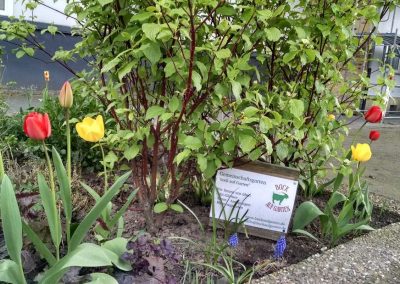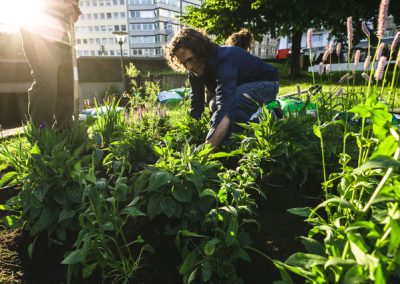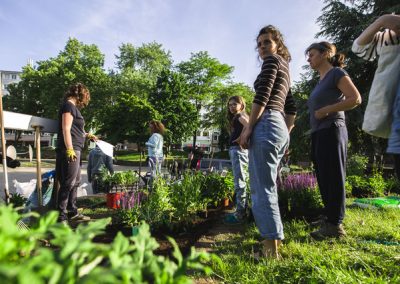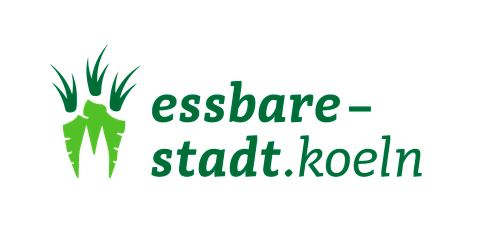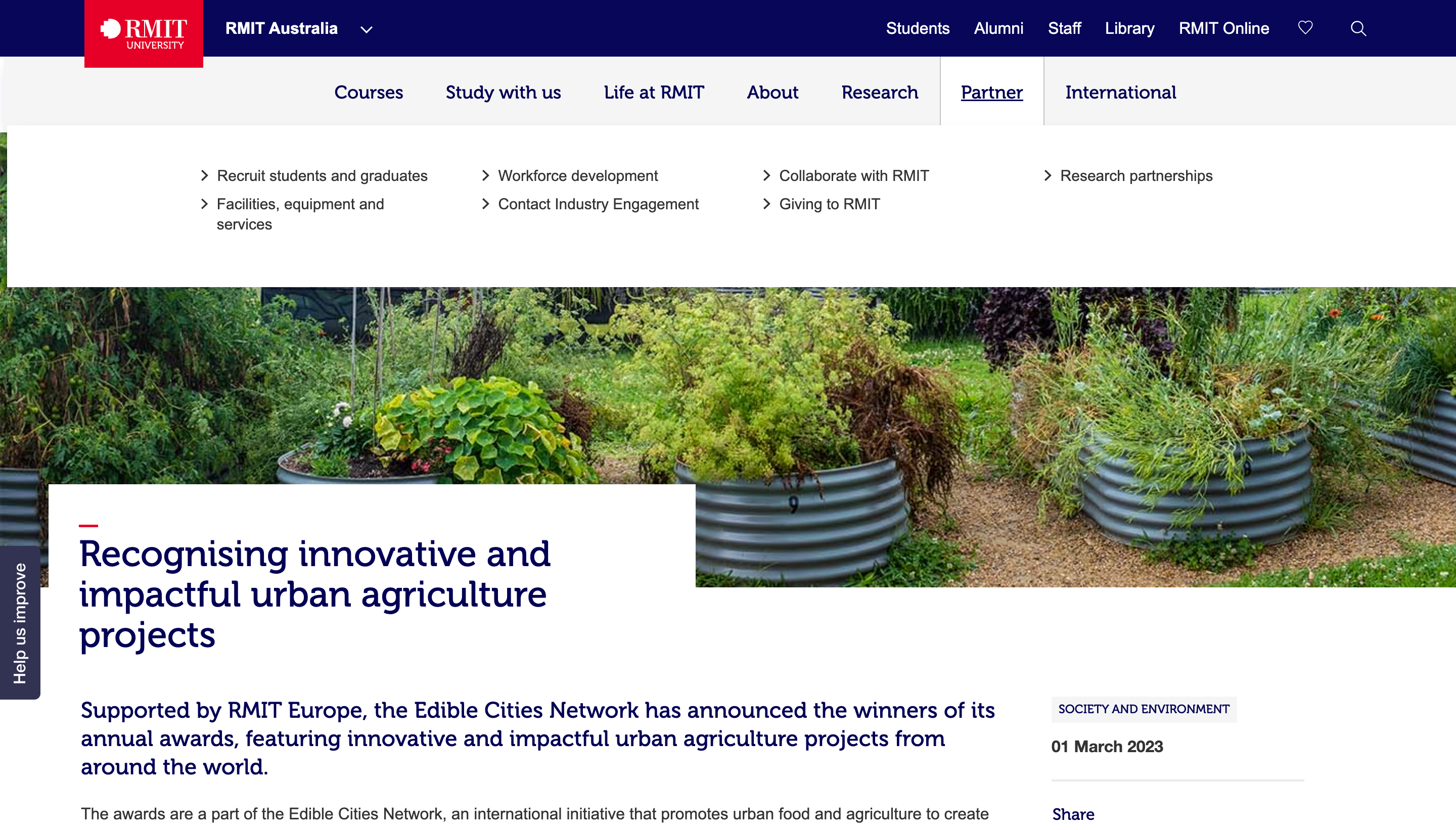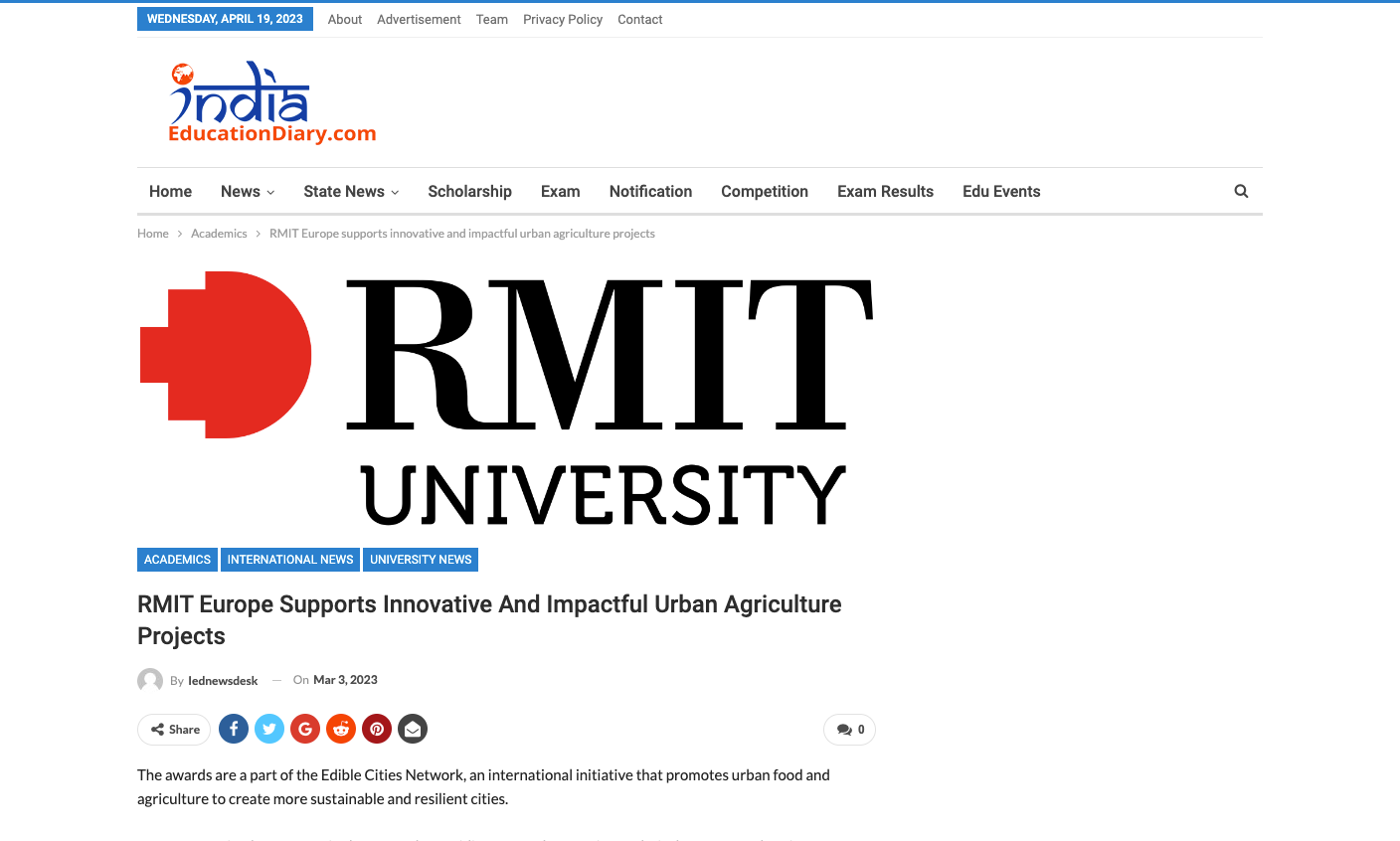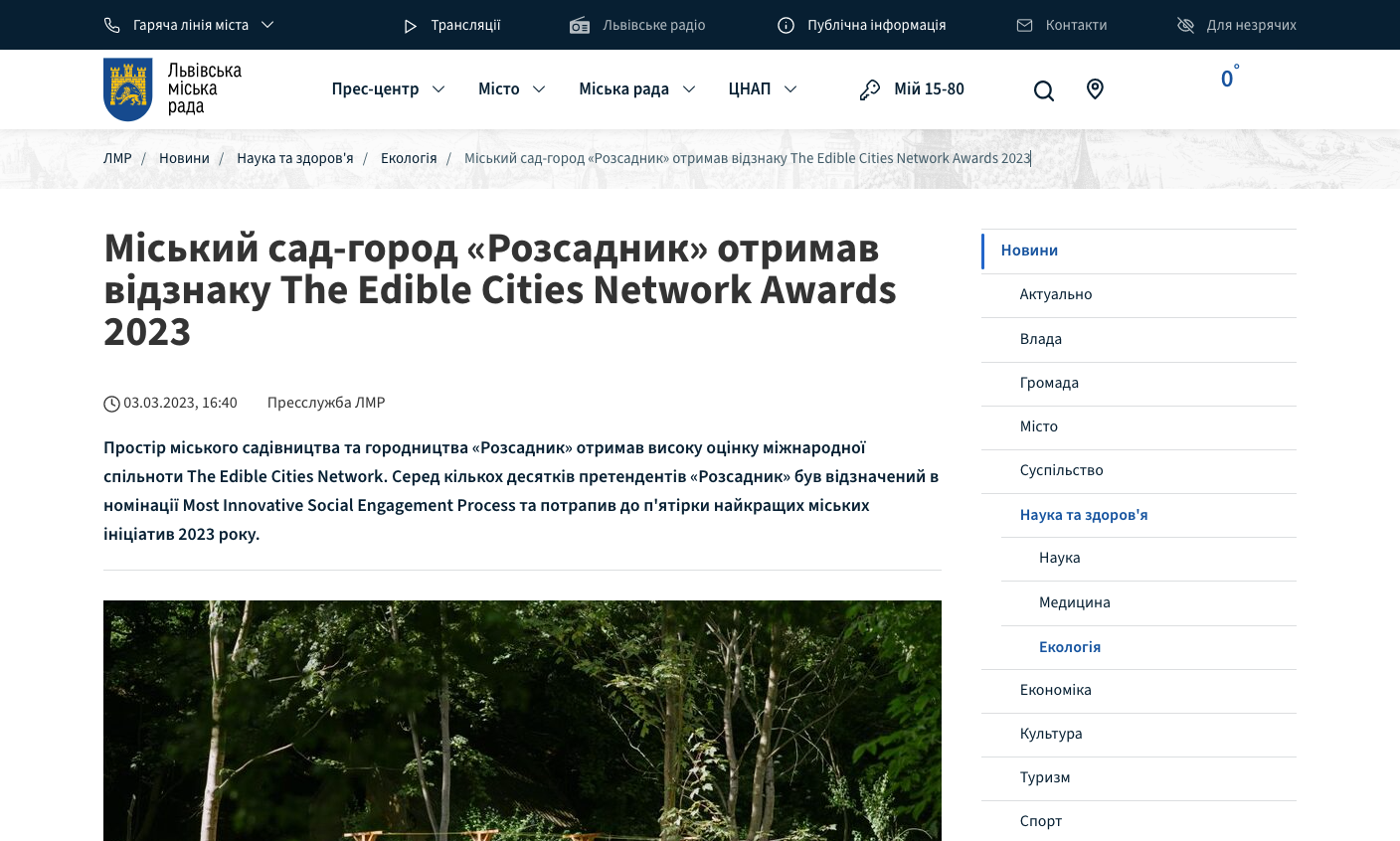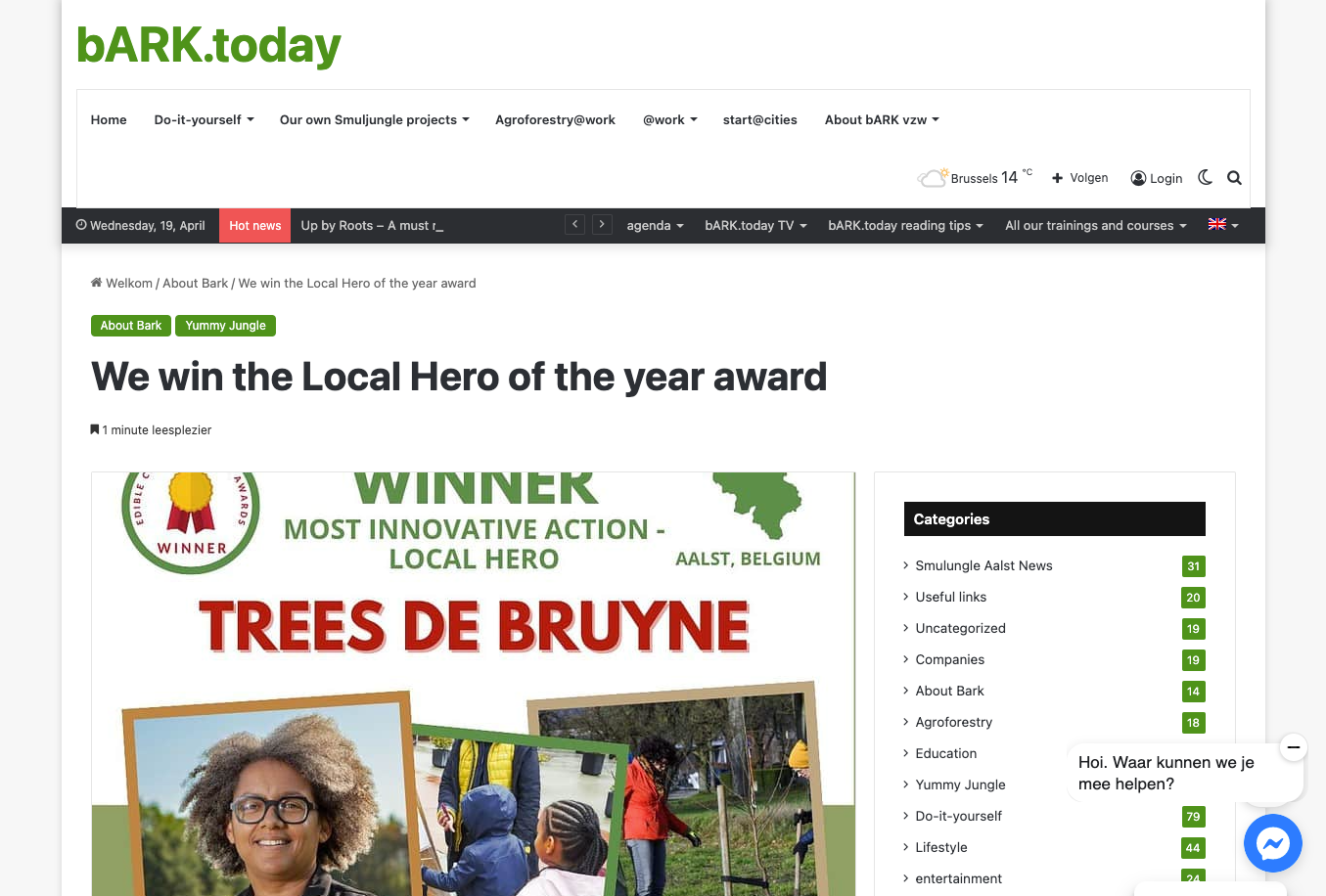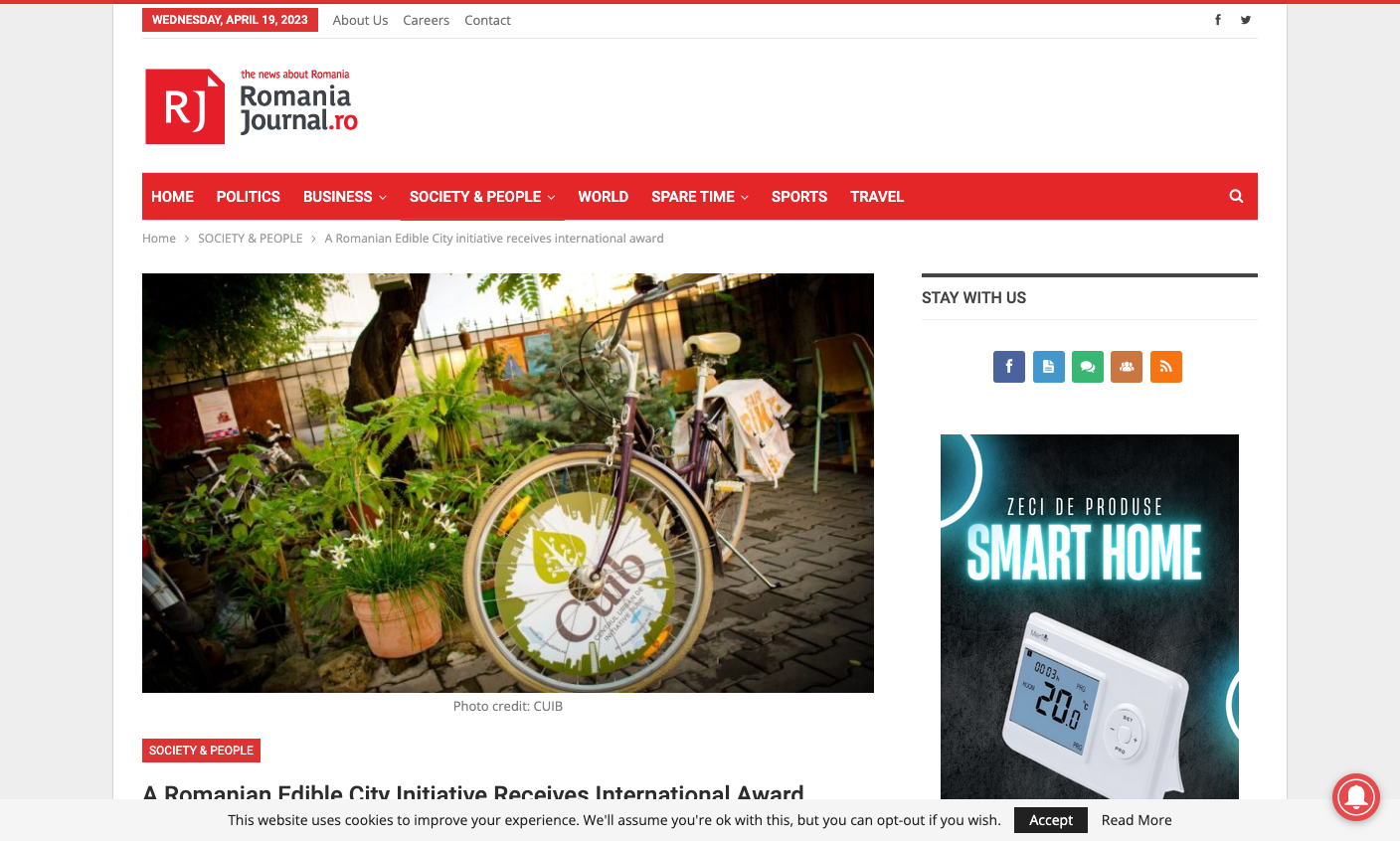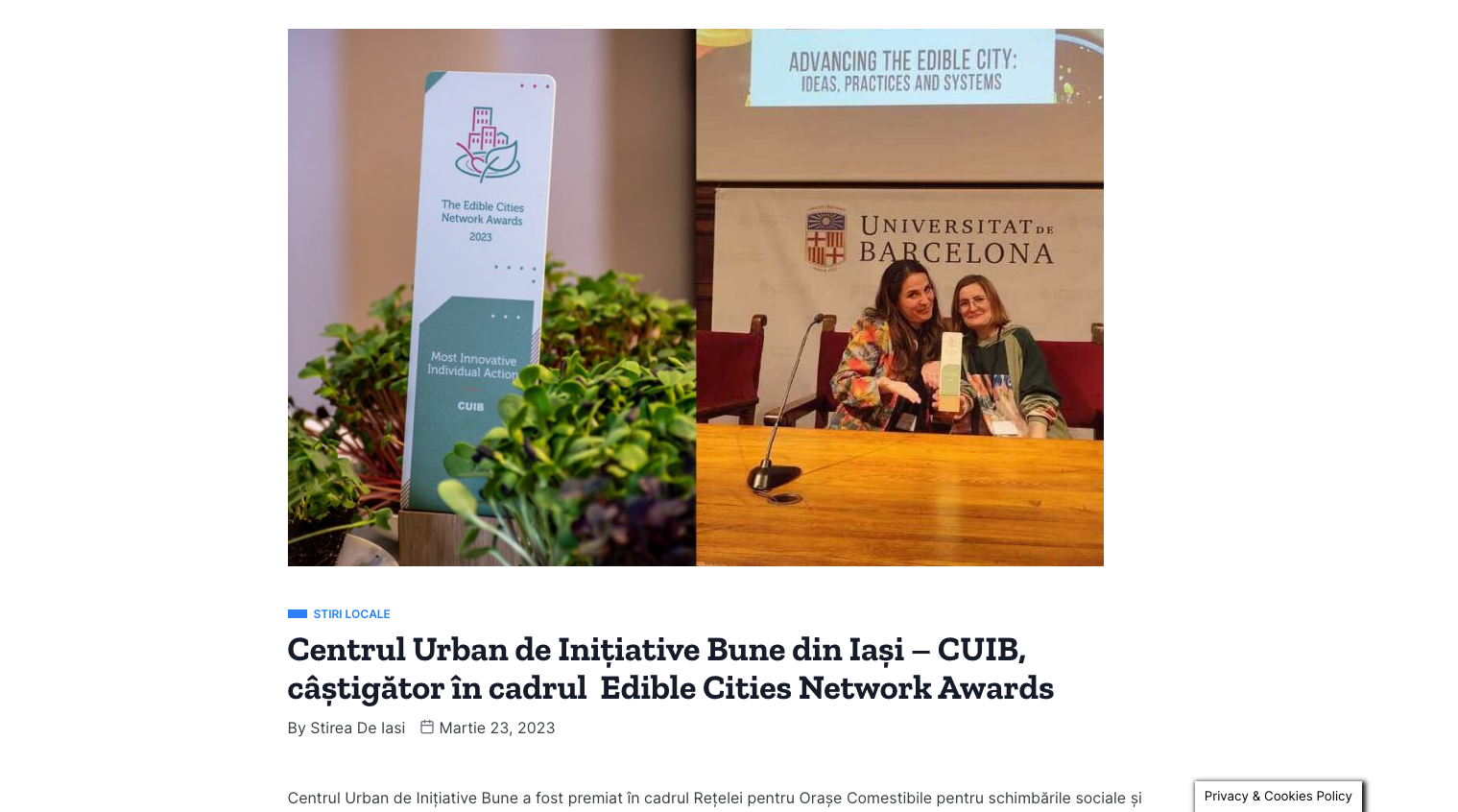MEET THE WINNERS OF THE EDIBLE CITIES NETWORK AWARDS 2023!
Category #1: Most Innovative Individual Action
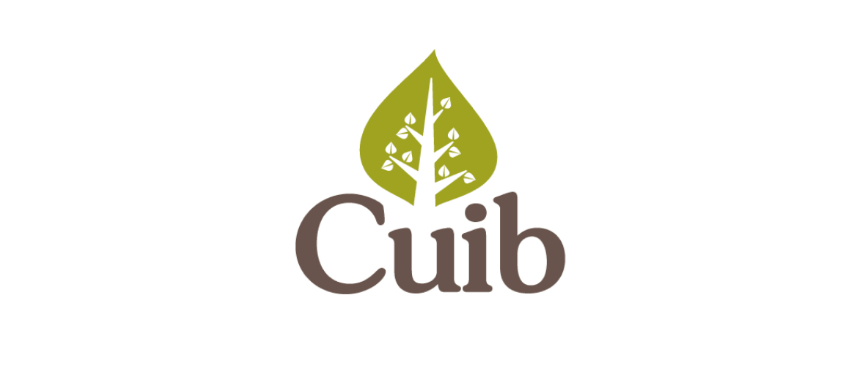
Most Innovative Individual Action
Operating as a plant-based bistro and a community-space, CUIB is a hub for sustainability in Romania’s second-biggest city, Iași. CUIB takes a holistic approach to sustainability, focussing upon nature, society, and economy. The hub operates a membership system that allows for a solidarity-model approach, its menu is currently 90% locally-grown menu, they use saved food wherever they can, food waste is turned into compost for growing new crops, free meals are offered to vulnerable communities, and it is making plans to go fully zero-waste.
CUIB – Centrul Urban de Initiative Bune
Category #2: Most Innovative Individual Action – Local Hero
Most Innovative Individual Action - Local Hero
Trees de Bruyne founded the NGO ‘bark.today’ at the beginning of 2022 in Aalst, Belgium, and has overseen the project since then, helping it grow into a thriving food forest in the town centre that has had over 330 participants. ‘Nature-connectedness’ drives the project, which includes mindfulness, storytelling, creative endeavours, and nature-based education within the food forest, creating new connections and long-lasting knowledge about urban food within the city of Aalst.
Category #3: Most Innovative Social Engagement Process

Most Innovative Social Engagement Process
‘The Centre of the Earth’ is an urban farm that has been operating for over 10 years in Athens. Its goal is local mitigation and adaptation to climate change through sustainable food production, taking an approach that focusses upon sharing agroecological and organic growing skills – with a particular focus on catering to vulnerable groups. Activities are co-designed and adjusted in conversation with participants, and to date over 70,000 adults and 50,000 children have participated in educational activities on the farm.
Category #4: Best Overall Edible City Approach
Best Overall Edible City Strategy
The Edible City Cologne is a citywide strategy working to make Cologne more ‘edible’. Its basis is an Edible City Action Plan which sets out how the city can improve its food system. This developed as a participatory project that became part of the city’s political agenda, and includes a programme covering edible public green spaces, community gardens, urban orchards, and more. As well as public spaces, they also focus upon bringing gardens into schools, housing associations, and companies.
The Edible Cities Network project is a global group of individuals and organisations, working together to make urban environments more socially and environmentally resilient through food system innovation – everything that makes our cities more “edible”.
In 2022 and 2023, the project awards prizes to recognize, inspire and promote innovative urban food initiatives with a demonstrated social and environmental impact.
Edible Cities Network Award Winners 2022
Learn more about each winner by clicking on the images below or watch the winners’ videos on the Edible Cities Network YouTube channel.

Mellomrommet
Oslo, Norway

Issam Ben Chaaben
Carthage, Tunisia

Restlos Glücklich
Berlin, Germany

Oslo District Farmer
Oslo, Norway
What can you win at the Edible Cities Network Awards 2023?
The winners receive:
- A travel grant of up to 2000 Euro for participation in the EdiCitNet Awards Ceremony at the Edible Cities Network Conference, which will take place on 15-17th March 2023 in Barcelona, Spain or a visit to one of the EdiCitNet Living Labs
- Promotion via the EdiCitNet website, social media and communication channels.
What is the evaluation procedure?
The Edible Cities Network Awards are assessed by a peer-to-peer vote and a panel of jury members. This year, on the jury, we have:
Laura Martinez, Director of Research, Nabolagshager AS
Alexandra Popartan, from the Universitat de Girona
Natalie Keene, District farmer for District of Old Oslo, Oslo Municipality
Vic Borrill + Ruth Smart, Brighton & Hove Food Partnership
Felix Mollenhauer – Consultant at BuGG (German Association for Greening of Buildings)
Latifa Bousselmi – Professor and Vice President of Research in Action Association, REACT
Edible Cities Network Awards in the Press
EdiCitNet conference entices city dwellers and planners with Edible City Solutions
29.03.2022
RMIT Europe News

RMIT Europe Supports Innovative And Impactful Urban Agriculture Projects
03.03.2023
India Education Daily
Roszadnyk urban garden received the distinction of The Edible Cities Network Awards 2023
03.03.2022
City Administration Lviv
The Urban Center for Good Initiatives in Iași – CUIB, winner of the Edible Cities Network Awards
23.03.2022
Stireadeiasi
Edible Cities Network Award Finalists 2021

Basket Project
Guangzhou
‘Basket Project’ is a policy initiated by Guangzhou City to meet the food supply for its 14.88 million inhabitants, by exploring the development of modern urban agriculture through a number of innovative methods.

Digital Beehive Project
Andernach
The Digital Beehive Project aims to install a system which monitors several aspects of the beehive, bee behavior and honey production while helping predict impending extreme weather events. The prototype is built from simple, sustainable and inexpensive components and is easy to maintain.

Kasselheim Sugar Pea Production
Andernach
Slow Food Rhein-Mosel wants to safeguard diversity by protecting ancient crop sorts such as “Kesselheim sugar peas”, an endangered local crop. The whole initiative, from sowing the peas to picking them to expose the seeds for the next year, was organised by volunteers of all ages. Sugar peas are easy to grow and serve as a soil conditioner. Their production improves local bio-cultural diversity and encourages reflection on food production/consumption behaviour.

Gamle Oslo District Farmer
Oslo
The District Administration of Gamle Oslo employs a full time District Farmer to practice urban agriculture in the parks with local youth in summer and with kindergartens the rest of the year. The goal of the project has several dimensions: for youth it provides green vocational training and at the same time more welcoming and thriving parks; for the kindergartens it means practical pedagogy in line with the sustainable goals and a greener outdoor play area for the kids.

Insect2Eat
Berlin
Insec2Eat’s mission is to bring more insects and insect-meal products to plates. Since insects are high in protein, fiber, omega-3 fatty acids, trace elements and antioxidants, they are a healthy and sustainable alternative to meat. Compared to conventional animal husbandry, insects need: less water, less space, no need for deforestation. Insec2Eat specializes in healthy alternative protein products without additives.

Issam Ben Chaaben
Carthage
Finding himself out of work, Issam Ben Chaaben decided to grow food in an empty plot of land near his house. His urban farming has grown into a source of employment and fresh produce for his local community. Now he sells his products to local merchants and restaurants in nearby towns and has been able to provide employment to two young people. His initiative has had an environmental benefit, too, with more birds and bees coming to the land.

Mellomrommet
Oslo
Located in what used to be an ignored space between building blocks in Stovner, a low-income suburban area of Oslo, a group of volunteers of all ages has created a green oasis – Mellomrommet. All tasks, building and planning are carried out by volunteers, and all the produce goes back to the community at no cost. Everyone can join at no charge and the area is open to the public 24-7.

RESTLOS GLÜCKLICH
Berlin
RESTLOS GLÜCKLICH is a non-profit organization dedicated to inspiring people of all age groups to reduce food waste through creative educational programs. Their current project is a comprehensive program for preschools, teaching children to value food, avoid food waste and develop a healthy and caring relationship to their everyday meals. The program fuels change within the children, their families and the institution itself. A strong focus is on preschools in socially disadvantaged inner-city neighborhoods.
Award Categories
The EdiCitNet Awards grant three prizes in the following categories:
● Most innovative individual action
This award recognizes initiatives and “local heroes” who have employed urban food innovation to address a specific societal challenge in their city in a way that inspires others and advances existing practices and knowledge in their city and beyond.
● Most innovative social engagement process
This award identifies and highlights innovative processes for engaging with and empowering citizens and particularly hard-to-reach socially disadvantaged individuals and communities through urban food innovation.
● Best overall Edible City approach
This award recognizes holistic city-wide initiatives or policies for tackling societal challenges through urban food innovation in an integrated and sustainable way that enables the generation of multiple long-term benefits for the city.
For more information on the evaluation process, click here.
We welcome all applications from diverse professional, academic, and cultural backgrounds, regardless of gender, religion, race, ethnicity, sexual orientation or ability. Find more information about the Edible Cities Network Awards and the full Terms & Conditions of entry here.
If you have any other questions, or for more information, please email
us at edicitnet-awards [at] eurtd [dot] com

